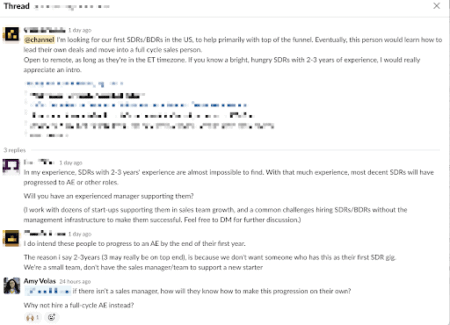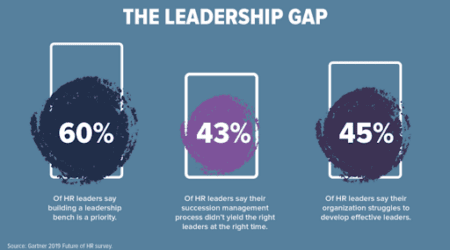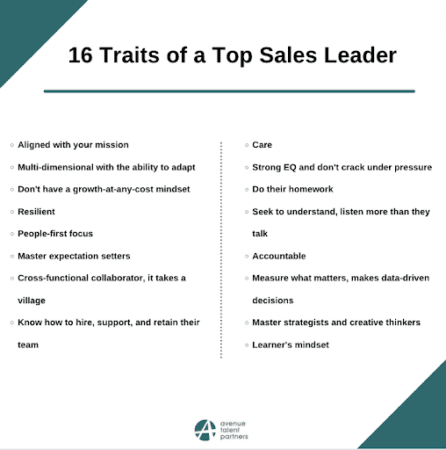
Why Sales Top Performers Don’t Always Make Good Sales Leaders
One of the biggest pitfalls early-stage founders make is thinking top salespeople translate to great leadership.
Let’s unravel the mystery!
Early on in my career, I got promoted because I was a top performer. They wanted me to lead others on the team to create similar results.
I jumped at the opportunity – not because I was focused on helping the team be their best, but because it was an ego boost.
So when I got into that leadership position, I expected everyone to be like me and do things my way. After all, it worked really well. In reality, what happened is that I alienated the team away, shut them down, and left them feeling frustrated, unsupported, and micro-managed.
It was a nightmare for all parties involved. As painful as it was, there was a silver lining of a priceless lesson that I carry with me to this day:
We can both be cyclists in the Tour De France. I might be on the American team, and you’re representing France. Regardless of who crosses the finish line first in each stage, it’s the same race for each of us. Let’s say I win the first stage, you win the second, and Belgium wins the third. Even though all of us are in the race and cross the finish line, we have our own style. Team France might be wearing hot pink spandex, the American team might have differently shaped helmets, and Belgium is all wearing the same cycling glasses… every team trains a bit differently and has its own approach to success.
Any team can find a way to win, even if it looks different from the last winner.
Even though my way led to great success and the top of the leaderboard, I didn’t know how to empower my team members to find their way across the finish line. And if I’m being honest, I failed miserably on the empowerment side of the equation:

It’s why I’m outspoken about the power of frameworks versus playbooks. The ability to learn, adapt, have business conversations, and lean into methodologies that translate to meaningful outcomes is the way.
Sales top performers excel at “doing,” but that doesn’t mean they have the skills to enable and empower others to achieve collective goals.
And from a leadership perspective, it’s about teaching versus telling. Talking “with” to understand and help versus talking “at” to demand and shut down.
Why Top Sales Performers Struggle In Leadership Roles
It’s that old adage that what got you here as a top performer won’t get you there as a leader. Personal success doesn’t directly translate to leadership success. Leadership is a different can of worms.
MckInsey’s definition of leadership nails it:
“Leadership is a set of behaviors used to help people align their collective direction, to execute strategic plans, and to continually renew an organization.”
It’s a big transition going from creating your own success to being responsible for helping others create theirs. These are some of the most common areas top performers struggle with once they get promoted:
- They don’t know how to delegate tasks and let go.
- There’s a tendency to micromanage. Top performers have a strong tilt toward perfectionism and control.
- A lack of effective communication to establish expectations early and often with their team, across their peer group, and up.
- A lack of patience to meet people where they are to understand how to create the right strategy, hire the right people, deal with conflict, and remove barriers for the team. Salespeople are not one-sized.
- Checking their ego to realize the team’s success is their success. Taking credit for their work is a surefire way to create a revolt.
- Difficulty coming up with a shared vision and guiding a team of people toward that goal.
- Performance management – going from friend to leader, delivering hard news, or making difficult, unpopular decisions is hard.
Top performers are used to directly impacting the company through their work AND being recognized for it. In leadership, their role shifts dramatically. As a leader, you must delegate effectively and empower your team to create that impact. That personal recognition can be difficult to let go of.
And that ability to empower employees is crucial in a leadership role.

This isn’t to say that top performers don’t make great leaders. Some make the transition seamlessly into the role, especially when they have the proper support, training, and leadership to guide them.
But you can’t assume that anyone will be effective in a leadership role without digging into their strengths, skillset, and experience beforehand while pinpointing where they need support to co-create a plan together. And if you haven’t done this before, you’ll likely find yourself in a blind leading-the-blind situation… holding everyone involved back.
Jim Clifton (Gallup’s Chairman and CEO) says that leadership promotions miss the mark because we are “failing to choose the candidate with the right talent” 82% of the time.
And the fact is, some top performers don’t want to be leaders… and that’s okay!
There are other ways to grow. After my first stint as a leader (a disaster), I chose to focus on mastering my craft instead. Things like opening a new market, taking on a new segment, top 100 accounts, top clawback accounts… anything I could to expand my skill set.
Growth isn’t always up the ladder. It can be across the function, too.
If you botch this promotion, you risk losing a successful territory, losing the person you promoted, AND harming your team and customers, setting everyone back with an expensive price tag to boot.
Understand What It Takes To Be A Sales Leader Before You Start Hiring
As a founder, you’ll never promote the right person to a leadership position if you don’t know what you’re looking for.
I’m in a group Slack channel of founders and sales leaders. Someone recently posted a thread looking for SDRs with 2-3 years of experience. He has no sales leadership and was making some risky assumptions:

In reality, any decent SDR will have progressed to an account executive or other role.
This is a perfect example of perception vs. reality. He wants to hire in a way that’s not realistic in this market AND he wants them to magically turn into managers without an experienced sales manager to guide them.
This is a perfect example of the blind leading the blind I mentioned earlier.
Founders, if you’re in the early days and you have someone blowing the doors off of your business and want to replicate that, it will be tempting to promote them. But before you can even think of hiring or promoting someone, you need to know the ins and outs of the role yourself.
And have systems in place to create an environment for great leaders to emerge.

Do you know what it actually takes to be a good leader in your company, or are you relying on someone else to tell you? Then, it’s time to closely examine your business and decide what makes the most sense at your stage for your team and what your marketplace needs.
- Why is it time to hire?
- What is breaking as you step away?
- What are you deprioritizing due to your involvement in sales?
- What is the team telling you?
- Have you ever led sales before, and do you know how to lead a sales leader without experience appropriately?
- What immediate challenges is this leader going to face in the role?
- How much time are you willing to invest to support this role?
- What specific goals would you want this person to achieve in the role?
- How does this help you achieve your bigger-picture goals?
- What would prevent this role from not working out, and how does that affect your business?
- How will you measure this leader’s success in the role beyond KPIs and metrics?
- Do you have product-market fit (PMF) to support building out a team?
- Do you have a budget to support this hire and their team to follow?
If you can specifically answer the questions above and are merely looking to get this off of your plate ASAP, how can you confidently promote someone while setting all parties up for success? If you’re not clear, it’s a recipe for disaster.
Even if you have a confident, ambitious top performer who’s joining communities, reading content, and getting mentored, pump the brakes.
There’s a difference between content, context, and actually being able to back it all up well with competence. There are 50 shades of sales leadership out there, and it’s easy to choose the wrong shade.
You can’t expect a person to learn how to be a great leader if you don’t have a system in place to get them there. Founders, that’s on you. Trying to figure out your blind spots when you don’t know what they are isn’t realistic.
These are the traits of excellent sales leadership to keep an eye on:

It all starts at the top. And this starts with you, the right time to promote someone, and the right foundation and feedback loop in place to support a successful road ahead.
Speaking of feedback… being open to feedback is a superpower for leaders – especially those who are new to the role – and critical feedback helps leaders improve in real time.
So when you bring a new leader on board, an environment that’s supportive of giving and receiving feedback allows everyone on the team to understand where they are, what’s working well, what’s falling short, and an action plan in place to get better.
What To Do With A Top Sales Performer Who Wants To Grow
It’s natural and normal for a top performer to want to grow into a leadership position. Just be careful not to jump the gun.
The first thing you need to do is be realistic in your hiring process. It’s tempting to throw out the hiring process when someone doing a great job and raising their hand to take on more already works for you.
This is a signal to STOP and audit your hiring process. Do you have an effective hiring system in place with the proper tools to evaluate this person to make a successful hiring decision confidently?
And then, can you back it up with the proper onboarding, training, and support, AKA “everboarding?”
If not, this might mean hiring a top performer and finding a leader with a proven track record of performing talented salespeople who can guide and promote them when they’re ready as the business grows.
I’ve previously written about the top 16 traits to look out for in a potential VP of Sales hire. You’ll never find a “superperson” who’s strong in all areas, but these can be a fantastic guide for what to look out for when hiring or promoting. The art of the process is figuring out which superpowers and traits your company needs most and finding the right match in a leader who can fill those gaps.
Something else I recommend for all founders is to invest in leadership training for themselves. When you have a strong foundation of leadership skills, it trickles down to the rest of your leadership team. And your eye will be much more attuned during the hiring process.
ScaleJOY is an excellent solution to meet you where you are to hone your leadership skills.
And then there is the power of community and connecting and collaborating with founders like you who have navigated their way through the same situation or are going through it currently.
A few founder-centric communities to consider:
- Venwise – a community for founders and C-suite executives
- Hampton – a private network for high-growth founders
- Startup Grind – a global startup community for founders
The best founders – the ones who are most successful with exits and impressive startup outcomes – prioritize three things:
- Leadership (including their own)
- Their people
- Their customers
Those three things translate into people, processes, and execution within a startup. Keeping a close eye on all of them can be markers that lead you to your own blindspots and keep you from making bad decisions while building and growing a sustainable business.
Need Help Hiring A Great Sales Leader For Your Startup?
Founders, it’s up to you to create a strong foundation for leadership excellence. Like anything that realizes a strong ROI, it requires an investment. Invest in leadership and communication training for yourself and your employees so when the need arises for a new leader, you’ll be able to make a well-informed, confident decision.
Nothing is more important than knowing the specific needs of your startup and staying aligned with your long-term vision. That’ll make all the difference and ensure you put the right people in the right roles at the right time.
Looking to hire a sales executive for your startup? Learn how we can help.
